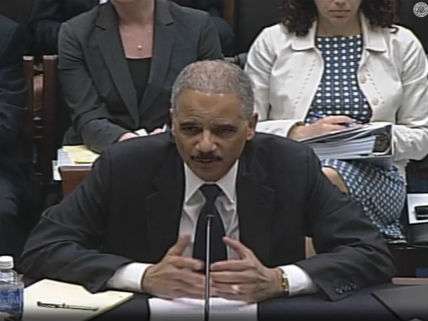The Washington Post Blames Obama for Fentanyl Deaths
The paper suggests that more drug law enforcement is the solution to a problem created by drug law enforcement.

A story in today's Washington Post makes the case that the Obama administration failed to take the proliferation of fentanyl as a heroin booster and substitute seriously enough, resulting in drug-related deaths that otherwise would not have occurred. The story is formatted in white type on a black background, interspersed with examples of people who died after taking fentanyl, so you know the Post's intentions are serious. I wish I could say the same about its argument, which makes much of press conferences that did not happen and reports that should have gotten more attention but fails to identify a single policy that would have made an important difference.
Reporters Scott Higham, Sari Horwitz, and Katie Zezima note in passing that the crackdown on prescription opioids pushed nonmedical users (as well as some bona fide pain patients) toward black-market alternatives, which are much more dangerous because their potency is inconsistent and unpredictable. Initially the main alternative was heroin, which was "cheaper and and more available," notwthstanding a century of government efforts to eliminate sources, interdict shipments, and put distributors in prison. To the extent that such efforts have been successful at all, they have encouraged traffickers to replace heroin with more potent products such as fentanyl, which makes it possible to pack more doses in any given volume and is "20 times more profitable than heroin by weight." Yet the main solution Higham et al. suggest is eliminating sources, interdicting shipments, and putting distributors in prison, a strategy that by their own account has manifestly failed to stop Americans from obtaining the psychoactive substances the government says they should not want.
Higham et al. implicitly fault former Attorney General Eric Holder's "Smart on Crime" initiative, which among other things urged federal prosecutors to refrain from triggering mandatory minimum sentences in run-of-the-mill drug cases involving low-level, nonviolent offenders. "Out in the field," they write, "some drug agents and prosecutors said they noticed an immediate difference, just as fentanyl started to show up on the streets." Draconian mandatory minimums "provide powerful incentives for people to talk," they explain, and Holder's policy deprived drug warriors of that weapon.
The Post cites Dominick Capuano, a former New York City narcotics cop, who "said federal prosecutors would no longer take the lower-level cases and morale among his drug agents plummeted as heroin and fentanyl overdoses soared." According to Capuano, the attempt to curtail the use of mandatory minimums undermined the NYPD's anti-drug tactics. "The low-lying fish is where you start the cases," he tells the Post. "Those are the people who flip, who give information, and that's what leads to these bigger cases."
Let us leave aside the question of whether threatening "low-lying fish" with manifestly unjust prison terms is morally justified because it "leads to these bigger cases." Is there any reason to think "these bigger cases," which had not stopped heroin from being cheap and plentiful, would have been any more successful when deployed against fentanyl? The fentanyl supply is, if anything, harder to disrupt than the heroin supply, since it is a synthetic product that does not rely on crops and enters the country in small packages from myriad sources, including the mail and private courier services as well as hidden compartments of vehicles crossing the border at legal ports of entry.
If there is a pattern to be seen in the facts cited by Higham et al., it is not the Obama administration's insufficient zealousness in prosecuting the war on drugs. It is the fultility of that endeavor, which never manages to block the supply of illegal drugs, as Donald Trump keeps promising to do, but does manage to make drug use more dangerous. Prohibition created a black market in which potency is highly variable, which leads to fatal dosing errors. Restricting access to prescription analgesics pushed more people into that market, resulting in more fatalities. Attempts to curtail the heroin supply encouraged the shift to fentanyl, which made potency even more unpredictable and drug-related deaths even more common.
But things can always get worse. Already the use of superpotent fentanyl analogs is on the rise, and the strategy implicitly endorsed by the Post is apt to encourage that trend.
"This is a massive institutional failure, and I don't think people have come to grips with it," John P. Walters, George W. Bush's drug czar, tells the Post. "This is like an absurd bad dream and we don't know how to intervene or how to save lives." Walters is absolutely right, but not in the way he thinks.


Show Comments (21)